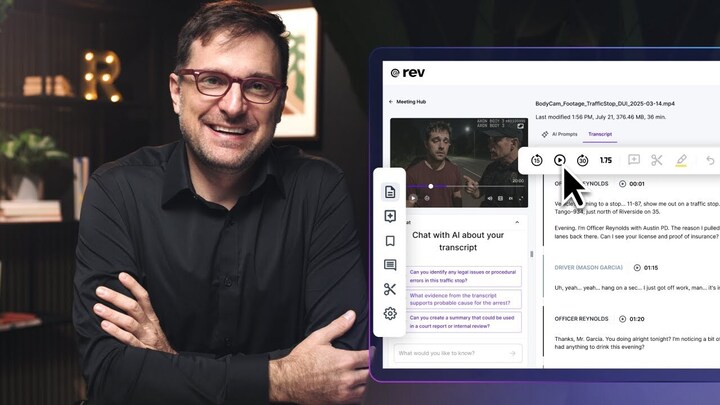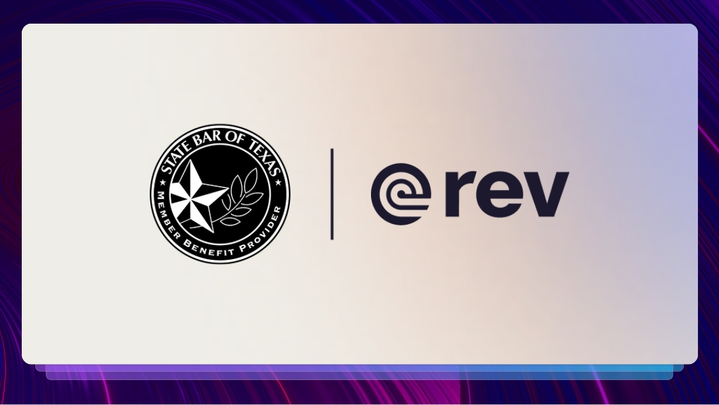How to Improve Financial Reporting With a Voice Recording App
Writing down financial jargon (terms, acronyms, and numbers) can often get challenging during an interview. Here's how a voice recording app can help!

Even for a seasoned writer, jotting down detailed notes during an interview is challenging. This is especially true when dealing with financial terms, acronyms, and numbers. Without a recording app, this finance jargon can get lost in translation during an interview or meeting.
Download Rev Voice Recorder App
With any topic, the best way to document interviews is with a recording app. Of course, note taking is very important but it’s easy to miss out on key details and be engaging at the same time. A recording app will allow you to capture everything that is being said, without having to worry about writing down every last detail.
A recording app records clear, crisp audio during your interviews. This allows the end listener to fully comprehend, understand, and easily transcribe the recording. Not getting a high-quality recording can lead to muffled audio, frustration, and spending more money. In fact, most transcription companies automatically charge an additional 50% of the total cost for poorly recorded interviews.
On top of that, you’ll have to spend more time managing the process. This can all lead to an over-budgeted project and wasted time. And we know how precious your time is!
So, let’s talk more about why using a voice recorder app is so essential when reporting financial terms.
Common Financial Terms and Their Meanings
As an interviewer, it’s your responsibility to be prepared to keep up in the conversation. Research your subject and topic so you can turn a good interview into a great one. By becoming familiar with certain financial terms and phrases, you’ll be able to more successfully interview someone without becoming lost or overwhelmed. Additionally, you’ll find yourself more engaged and asking follow-up questions that can lead to some really great insight.
Of course, there’s plenty more that you can do to prepare for a successful interview. We’ve highlighted below some important financial terms to know before conducting an interview with a recording app:
Liens, Assets, and Bonds—oh my!
Financial Term #1: Asset
This finance term applies to anything of value that a business owns. Such items can be either intangible or tangible and can include cash-on-hand, buildings, equipment, and inventory.
Assets are reported on a business’s balance sheet for accounting purposes. Usually, accounting and financial departments deal mostly with assets. Since they help to increase a company’s value, CEOs and CFOs are often up-to-speed on all the assets.
Financial Term #2: Working Capital
Sometimes this term can be confused with fixed capital but it’s actually not the same thing. Working capital combines all finances associated with maintaining the day-to-day operation of a business. Basically, working capital is equal to cash-on-hand or a business asset that can be quickly turned into cash.
While this can be conjured as another accounting term, business owners pay close attention to their working capital.
Financial Term #3: Accruals
Accruals is another team used mostly by accounts or in the accounting department of a company. Accruals are all expenses that have been incurred by a business but haven’t been recorded in the books. Some of these expenses include wages and payroll taxes.
It’s also important that provisions are made for accruals before closing off an accounting period, which would be the responsibility of the accountant for that company.
Financial Term #4: Capital Gains
Capital gains are the increase of value to an asset or investment above the original purchase price. They are usually referenced in real estate and stock. It’s important to note that the gain is only on paper until the asset is sold.
For example, if someone bought a house for $160,000 and sold it for $200,000, it would be “raining money.” The homeowner would have made $40,000 in capital gains (minus some fees and realtor commission).
It’s important to note that on both a business an individual level, capital gains must be claimed on income taxes.
Financial Term #5: Net Worth
Net worth is the difference between a person’s assets and liabilities. It’s calculated by adding up all money and investments (home value, car, checking and savings accounts, and stocks) and subtracting all debt (mortgage balance, credit card debt, and loans).
Knowing your net worth will give you a great understanding of your financial health. This can assist in making big financial decisions, especially for those business owners.
Financial Term #6: FICO Score
A common bank and credit term, a FICO score is used by financial institutions to determine a borrower’s creditworthiness. Standing for Fair Isaac Corporation, this score is calculated on a variety of different factors including payment history, length of credit history, and total debts.
Ranging from 300 to 850, typically, the higher the FICO score, the better chance a borrower has to get approved for a loan.
If a score is lower than 650, it might be a bit difficult to obtain a loan or credit card with a good interest rate and reasonable terms.
Financial Term #7: Lien
A lien is the legal right to keep possession of property belonging to another individual until they pay off the debt.
For example, a lien can be granted to an individual taking a loan out from a bank to finance a car. This individual buys the car and pays back the seller from a bank loan. In doing so, the bank puts a lien on the car. This means if for some reason the individual can’t repay the loan, the bank can seize the vehicle until they pay back the loan in full.
Financial Term #8: Retained Earnings (RE)
The formula used to calculate retained earnings is the beginning period RE + net income (or net loss) – cash dividends – stock dividends. Basically, retained earnings is all the money not given to shareholders.
This term is crucial for upper management and business owners to know and understand. They can use this surplus of RE to reinvest in the business for future growth, to hire more salespeople, or to put towards a new product launch.
Financial Term #9: Rebalancing
This is the procedure of buying or selling investments to ensure you have the right asset allocation. For instance, say a person desires an allocation of 50% stocks, 30% bonds, and 20% cash, but the stock market is tanking. They might want to shift to 30% stocks, 40% bonds, and 30% cash. If, eventually, they want to return to 50/30/20 asset allocation, then rebalancing has to occur by buying stocks and selling bonds.
Financial Term #10: Bonds
Basically, bonds are investments in debt. Meaning that when a bond is bought, it’s lending money to a specific entity such as the government or corporation. Bonds are bought for a specific period of time at a fixed interest rate. The entity will receive interest payments periodically and will receive the full loan amount back at the bond’s maturity date.
Bonds are typically used by governments, municipals, and corporations.
Financial terms ✅, now to the interview.
Tips to Successfully Report Financial Jargon During an Interview
Now that you’re up-to-speed on some popular financial terms, let’s talk about how you can successfully conduct an interview, specifically with a recording app:
There are several ways to make an interview full of financial jargon less-cumbersome. But the best tip we can provide you is to make sure you engage with your interview subject. That is by far more important than trying to rapidly capture every word and risk distracting your interviewee or, worse, disrupting the flow of the interview.
Utilize a Voice Recorder App
A recording app is an essential tool to successfully capture someone’s thoughts during an interview. Why? A recording app allows you to skip note taking. Of course, you can always jot down key phrases and quotes during the interview. Thankfully, having a recording device allows you to stay focused instead of vigorously writing everything down. In addition, you also won’t have to ask the interviewee to repeat themselves multiple times if you missed something during your note-taking.
Remove All Distractions from the Room
Even with a recording app, it’s important to set up the room that’s free of distractions. We also recommend that you make sure that all phones are silenced, doors and windows are closed, and you pick a location that’s mostly free of outside noise. This ensures that your recording will come out clean. And, removing distractions will help to put both you and the interviewee at ease.
Focus on Engaging with the Interviewee
Lastly, but most importantly, utilizing a voice recorder app will allow you to be engaged with the interviewee in a more meaningful way. This is because you’re focused on their words and responses instead of note-taking. This subtle encouragement will allow the interviewee to relax as you ask them more complicated, deeper, and intense questions. It also shows them that you’re focused on what they have to say, which could encourage them to be more open.
Why You Should Consider Using a Voice Recording App
Having a recording of your interview is the best way for you to easily reference key parts of the conversation quickly, rather than combing through pages upon pages of notes. Using a simple recording app allows you to stay more present in-the-moment allowing for a smooth and seamless interview. You’ll be equipped to accurately capture more complex thoughts and financial jargon as well.
Which recording app should you choose? Enter in Rev’s Voice Recorder app.
Rev’s Voice Recording App
The main function of Rev’s app is that it pairs voice recording and transcription services in one, making this app every reporter’s best friend. Plus, it’s more than just a simple recorder. The Rev recording app features excellent sound quality and easy-to-use functionality.
With this recording app, you’ll also have access to your files whenever you need them. You can also edit and organize your recordings in the app too. In addition, the Rev Voice Recorder app can easily send files through email, a text, Evernote, email, and much more. The app makes sharing it with co-workers, the media, and your interviewee very convenient.
What’s the best part? You can do this all from your phone without the worry that you have to carry and remember another device. It really doesn’t get much easier or more convenient than that!
Make Your Next Interview a Breeze
As a busy reporter, we know that you might not have the time to dedicate to transcribing the recording. With the Rev recording app, you can order a professional transcript with 99% accuracy and receive it within 12 hours. Having a transcript of your interview will allow you to write your article much easier and faster, saving you time and money.
The benefits really are endless when using a recording app for an interview. You’ll be more engaged and focused on asking the right questions to get the right answers. Best of all, you can listen to the interview over and over again. All of these are essential when conducting an interview with complicated financial terms.
So what are you waiting for? Save yourself time, money, and major stress by using the great quality voice recorder app from Rev. Learn more about our recording app today.















